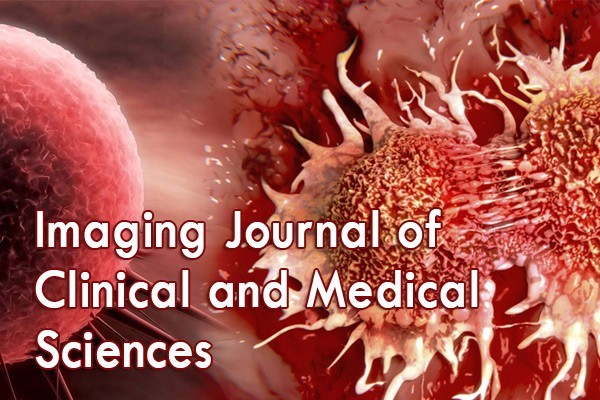Angioimmunoblastic T-cell lymphoma (AITL) is a frequent subtype of peripheral T - cell lymphoma (PTCL) characterized by generalized lymphadenopathy, hepatosplenomegaly, and frequent B - symptoms.
Volume 2 Issue 1 - 2016
Cytokine Production and Human Cytomegalovirus Load in Allogeneic Hematopoietic Stem Cell Transplantation Outcome
Objective: To investigate the impact of cytokine levels (IL-1β, IL-6, IL-10, IFN-γ and TNF-α) and Human cytomegalovirus (HCMV) load in the saliva and blood on the survival of allogeneic hematopoietic stem cell transplantation (allo-HSCT) recipients.
Recent evidences demonstrated the importance of bone marrow derived Endothelial Progenitor Cells (EPC), in the contribution to postnatal physiological and pathological neovascularization, and in tumor growth and angiogenesis. These cells are recruited undifferentiated, in response to systemic or chemoactractive signals, such as Vascular Endothelial Growth Factor (VEGF), they lodge in the growing or lesioned tissue and differentiate into endothelial cells in response to local stimuli and cell-cell interactions.
Volume 1 Issue 1 - 2015
Anti-VEGF Therapy Induces Proteinuria through Endothelial Disorganization Leading to Nephrin Decrease in Podocytes
Background: VEGF is involved in cancer development by stimulating neo-angiogenesis and tumor proliferation. Anti-angiogenic therapies, especially tyrosine kinase inhibitors such as sunitinib, have significantly improved cancer prognosis.
Probiotics and Bone Health: It takes GUTS to Improve Bone Density
Probiotics are a class of symbiotic bacteria whose administration in adequate amount provides health benefits to the host by altering the composition of gut microbiota. The gut microbiota is known to regulate both the host immune system and metabolism, leading to increased bone mass by inhibiting bone resorption.
N-Methyl-D-Aspartate (NMDA) Receptors: Therapeutic Target against Cancer
Glutamate mainly acts as an excitatory neurotransmitter in the central nervous system controlling variety of neuro-physiological functions like synaptic signaling, learning, memory, etc. However, uncontrolled or excessive production of glutamate is neurotoxic and can damage neurons by over activation of glutamate receptors termed as "glutamate excitotoxicity". Apart from excitatory neurotransmitter role of glutamate, some recent observations suggest glutamate as a potential growth factor for tumor development.
SMART Drug Based Targeted Delivery: A New Paradigm for Nanomedicine Strategies
Introduction: Targeted drug delivery systems are nanoscale drug carrier molecules designed for improving the communication of cellular and molecular components and biodistribution of tumour targeted drug (chemo) therapeutics. Nanomaterials are generally clusters of molecules, atoms and molecular fragments into extremely small size particles (1-100 nm) in nature.
Are Cladribine and Rituximab Enough for the Treatment of Relapsed Hairy Cell Leukemia?
Introduction: Hairy cell leukemia is a rare B-cell lymph proliferation with long-term survivals, in general. Although therapeutic possibilities have progressed over time, many patients have recurrences and the disease can become resistant to treatment. Discovering the BRAF V600E and other genetic mutations and some pathogenetic mechanisms disruptions open new therapeutic horizons.
Adiponectin Regulates the Development and Progression of MCA-Induced Sarcoma in Mice
Background: Sarcomas are malignant tumors with low survival rates and remain refractory to the current therapeutic methods. Adiponectin plays crucial roles in many physiological responses. Studies have shown that adiponectin could regulate various tumors. However, the roles of adiponectin in sarcomas remain unknown.




 About Journal
About Journal  Aims & Scope
Aims & Scope  Submit Manuscript
Submit Manuscript 





